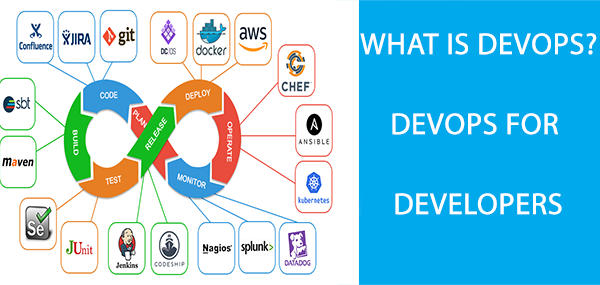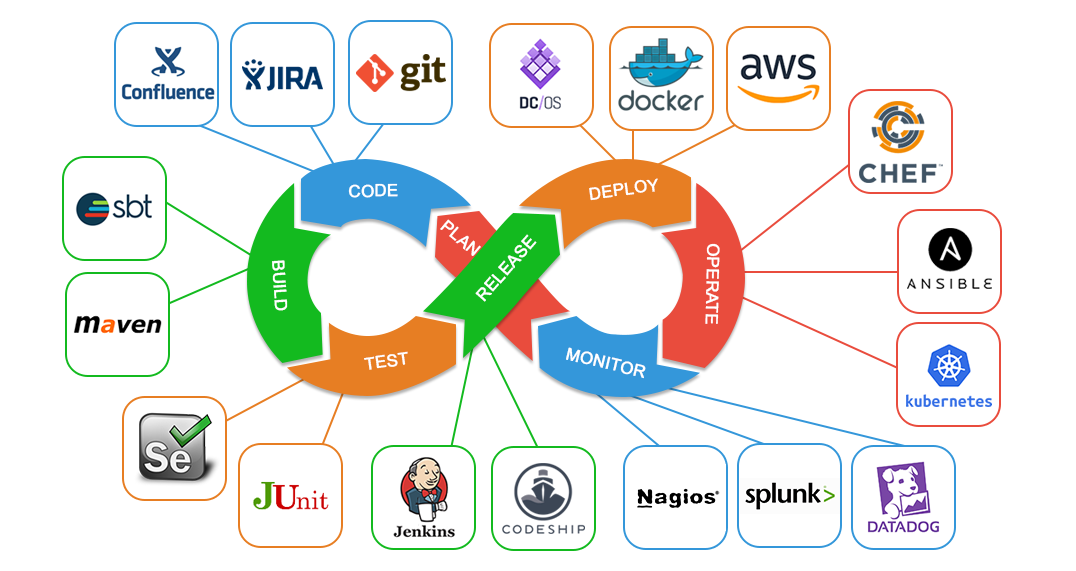What is Devops?
The term DevOps stands for development and operations. It is the blend of practices, cultural philosophies, and tools that increase an organization’s ability to build, test, and deliver reliable applications at high velocity. DevOps practices combine both software development and IT operations and reduce the systems development life cycle while providing uninterrupted delivery with high software quality. So in this article you will know what is devops?
DevOps’ practice evolves and improves products at a faster rate than the firms and organizations using the traditional infrastructure management processes and software development. Working with this pace helps the business organizations improve business functions, compete more effectively in the market and serve their customers better.

Working Principle of Development Ops
In DevOps, operations and development teams are no more ‘isolated but work as one to achieve common goals. Security and quality assurance teams usually become more integrated with the operations and development during the entire lifecycle application.
On a Dev Ops Team, if security is the focus, then it is sometimes referred to as DevSecOps. The teams use a stack of technology and tooling, which assist them in operating and evolving applications reliably and quickly.
Their practice automates those processes that have been slow and manual. With those tools, engineers accomplish tasks independently that typically call for help from other teams.
Continuous Integration/Deployment
Continuous deployment can be defined as the set of practices and coding philosophy that enables development teams to check-in code to version control repositories and implement small changes. As different developing codes are required for different tools and platforms in most modern applications, the team needs to integrate and validate changes.
Docker Tool
Docker is an open-source tool used to develop, deploy, and operate the application by using the container. Developers pack all application parts like libraries through Docker Development Operations and ship them as a single package.

Why DevOps Is Becoming Popular These Days?
The implementation rate of Developer Operations has significantly increased. In 2017, about 74% of the world’s organizations adopted the Development Operations. With time, this rate is only growing. Here are some important reasons behind the popularity of Development Operations.
1. Faster Innovation (Amplified Business Agility)
Resources are used to their optimum level.
Businesses get success if they have the ability to innovate faster. Joining development and operations efforts, the teams develop applications that are ready to use by consumers more quickly. This allows the establishments to be at the right pace with the dynamic market, increasing business agility.
2. Improved Cooperation Reduces Time To Market Cycle
Experimentation and innovation become more effective when trust develops among teams. With improved Development Operations development culture, the working units are more productive and happier.
They now focus on bringing their product to production or market accordingly with the key performance indicators fully organized. The passing of the product to the processes and waiting phase is eliminated. Also, all individuals have a common goal, which makes processes more transparent, fast, and reliable.
3. Less IT Staff and reduced Cost
All the Development Operations benefits translate into reduced requirements of IT staff by 35% and general costs by 30%. It also reduces the cost of quality by automating tasks and processes.
4. Reduced Implementation failure and Recovery Time
Product uptime is a significant advantage of using Development Operations.
Programming defects are the main reason for the implementation failure by the teams. Dev Ops promotes code versions with a smaller development cycle, which makes detecting code defects easy.
With agile programming principles, the number of implementation failure is reduced. Recovery time is also an essential issue as failure can be expected at any time. When operations and development teams work together and share ideas, the recovery time becomes faster.
5. Higher Competencies
Increased productivity brings increased customer satisfaction.
High efficiency makes development less prone to errors. There are different ways to automate Development Operations jobs. Code testing process is automated with continuous integration servers; hence the amount of manual work is decreased.
Another way to increase efficiency is by speeding up the tool. For example, you can compile code more quickly with acceleration tools. The scalable infrastructure like cloud-based platforms enhances the team’s hardware resource access, and the result accelerates the testing and deployment.
Now, is Developers Operations a good career?

Career Prospects for Development Operations Engineer
The technologies are constantly emerging and evolving the way businesses work, and Developer Operations is one technology that belongs to the future. No wonder there is a steady spike in demand for Developer Operations experts in various job roles. Here are some reasons why a career in Developer Operations is getting popular day by day.
High ROI Produces More Job Opportunities
One reason for the demand for Developer Operations professionals is the ROI. With the implementation of Development Operations, the annual profit of the company increases. Whether businesses invest their money in automation engineers, Docker container usage, configuration management, continuous integration/delivery, or all of these, they will get the biggest paycheck by the end of the year.
Definite Career Path with Promising Steady Growth
A DevOps engineer must possess a broad knowledge spectrum of SDLC (Software Development Life Cycle). You can start your career as a Release Manager, then Development Operations test Engineer, Development Operations Cloud Engineer, and then the highest designation of Development Operations Architect.
According to Glassdoor, these roles offer an average of $81 000 for the Release Manager, $115,000 for the DevOps Test Engineer. DevOps Architect or Development Operations Cloud Engineer provides around $130 000. Many tech giants, including Facebook, Barclays, and Accenture, always prefer to hire professionals with Proficiency in Development Operations.
Today, among the highest paid professionals in the IT industry, Development Operations engineers are on top.
Minimum Failure Chances
Today, most applications are switching to cloud-based platforms, but this is only possible if you have some DevOps professionals in your team. In short, infrastructural and cloud processes are complementary if applied through DevOps.
Deploying proper processes help ensure the continuous and integrated performance of processes. That is the reason why businesses and IT projects are hiring DevOps engineers more than ever.
Roadmap to DevOps Career
Though DevOps career is rewarding, it is also challenging; therefore, there is a lack of talent in this industry. Only those get higher salaries who have advanced DevOps certifications and strong DevOps skills.
Let’s start your DevOps career by following some essential skills that organizations look for when hiring a DevOps engineer.
- Scripting knowledge and Linux fundamentals.
- Good hands-on knowledge of different DevOps technologies (development, testing, and deployment tools like Docker, Jenkins, Kubernetes, Splunk, etc.)
- Good understanding of different concepts like Infrastructure as Code.
- Development experience of digital pipelines (CI/CD pipelines)
- Cloud service platform knowledge (Azure, GCP, AWS)
To become a DevOps engineer, there is no formal career path to follow. DevOps professionals are either developers interested in network operations and deployment, or they are system administrators having an interest in coding and scripting and progress towards the development side to improve test and deployment planning.
Also, people who are interested in coming out of their defined spaces and want to gain a more holistic view of the technical environment choose a DevOps career.
If you are interested in joining the Development Operations positions, you should start gaining skills and experience to compete for these jobs. This includes enhancing coding skills, learning automation tools, and searching out the roles and projects that let you practice soft skills such as collaboration and leadership between teams.
Now, how to learn DevOps?
Online Courses to Learn DevOps Skills
Below are some resources to learn DevOps skills online effectively for best DevOps training;
Ansible for Beginners course
This Udemy Development Operations course is designed for Development Operations beginners who take a start with Ansible. The course begins with an Ansible introduction with various practical exercises that gives hands-on experience. You can practice these exercises easily in your browser.
Development Operations Foundations
The course below covers the basics of DevOps. DevOps foundations give a thorough understanding of the DevOps tools and methodologies that establish a strong foundation.
Terraform
This Development Operations Udemy course focuses on Automation using Terraform tool. It is an infrastructure automation tool that runs on every major cloud provider. A strong grip on Terraform tool is a bonus for every individual who wants to learn DevOps.
DevOps and SRE
This course is also for DevOps beginners and offers a catalog of The Linux Foundation for learning best practices of learning DevOps and Site Reliability Engineering. It covers a broad range of topics from DevOps methodologies, containers, CI.CD concepts, and cloud computing.
Dev2Ops
It is more like a personal blog than a resource repository. Dev2Ops is the combination of useful DevOps tool insights and discussions and serves to deliver advanced information other than simple library code. It releases two articles every month.
Final Words
Now you know all about “what is DevOps,” its benefits for organizations, and why DevOps for developers is essential to learn. So, if you wish to enjoy better prospects as a developer, learning DevOps can be a good idea.
Related Courses
- Top Java Frameworks For Developers – Java development MVC frameworks
- Best CMS for web developers to learn in 2021 and beyond
- Top IT Certifications for Professionals in 2021 and beyond
- Best E-Commerce Frameworks Developers Should Learn
- Best PHP Frameworks For Developers – Top PHP MVC frameworks
 Best Tech Blog For Programming Articles And Video Tutorials Code Is Easy
Best Tech Blog For Programming Articles And Video Tutorials Code Is Easy





